
Features | Lists
By The Staff

Professor Murder
Professor Murder Rides the Subway EP
(Kanine)
I decided to hit up Professor Murder’s set at a packed-to-the-gills Pianos during CMJ this year on the strength of one listen through Rides the Subway and some encouragement from Mark Abraham. Really, all it should have taken was the one listen through: the group exhibits more goofy charm and rhythmic brilliance in the 15 minutes of this EP than most of the bands of the dance-punk period have shown over the last few years. The four songs (and one brief a cappella interlude) that make up the EP are all irresistible: “Champion” is all steady repetition and chanted choruses, “Free Stress Test” sounds like the second coming of ESG, and “Camron’s New Color (Part 3)” rides the drum breakdown like a polished funk outfit. Then there’s “The Mountain” riding in on one of the sickest bass lines of the year, matching it with an absolutely diamond-cut high-hat line, but making the focus of the song that piercing, reedy melody. Sure, they don’t have to contend with the challenges of a full-length here, but Rides the Subway makes a pretty convincing case that dance punk shouldn’t be considered dead just yet.
Peter Hepburn

Sunset Rubdown
Sunset Rubdown EP
(Sub Pop/Absolutely Kosher)
If it wasn’t for that coy little moustache and those helicopters always spinning around the dregs of stupid little civilizations, Spencer Krug would’ve been a figure of medieval madness for 2006, plague victim, postule-scratcher, under straw shirt and all. He’s romantic, and so then he’s unflinching with faith, his lyrics tending towards vague, personal Edens on the brink of tonsure. Love is sacred, belief is transfigurative while still instinctual, sacrifice is love, and so on, and such. Apocryphal colors dressed as normal colors swarm into the sky like terrible trinities; the wind fucking drowns out all doubt or protest because Krug acts like sin is unrelenting. And so is Sunset Rubdown, the EP especially, unrelenting I mean, it’s a brief causeway of pinpoint vision. Frankly, I’m intimidated by the guy. It’s hard to get a word in edgewise, all that lyrical tightness hard-pumping with the vitality of plain ole fucking abstraction, and how I end up vulgar and clumsy in comparison.
And just when you thought 2005 was the Year of Krug, Spencer fucks up his ordainment and puts out two fantastic albums preceded by a fantastic EP. And even if the self-titled snippet works as little more than a prelude to Shut Up I Am Dreaming, that gooey Golem of avant-ballads and mud, the five songs in attendance here develop a beautiful consistency, tiding the acoustic guitars and organs with archaic mood and invigorating each melody with skewed repetition. If I’m building a myth here, then Sunset Rubdown’s EP is a collection of psalms, odes, and barking beatitudes. If, in fact, our faith is vilified and Krug’s Holy See eventually dries up under the heat of hype, or of increasingly detrimental production, or of the intractable exhaustion of prolificacy, or of the guy’s sultry asexual reproduction obsolescing the need for modern mating, we’ll still have 2006. Until then, may this mummy of a man never find salvation.
Dom Sinacola
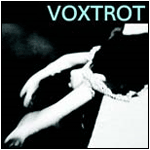
Voxtrot
Mothers, Sisters, Daughters & Wives EP
(Cult Hero)
Voxtrot plays with hooks like a kid learning how to fish: fascinated, distracted, destined to hurt themselves, and destined to land some big ones. On the awkwardly-titled Mothers, Sisters, Daughters and Wives EP, they exhibit all of this all the time, skirting near-disasters by discarding perfectly-crafted musical ideas only to follow them with ones that are bigger and bolder. These guys throw away hooks that lesser bands would kill to craft a whole song around; the “a-ha!” moment that is perfectly embodied by the shift in Franz Ferdinand’s “Take Me Out” happens to me at least three times on Voxtrot’s title track alone. It’s an absurdly powerful song, and coupled with the simple, heartfelt lyrics (“Who says you have to lose a love to find one?”) made it one of my favorite songs this year.
The rest of the EP is equally powerful musically, which is absolutely necessary to recover the drama and bombast of the lyrics from meaningless oblivion. Peter’s review aptly points out that “Soft & Warm” has “a chorus that could easily devour itself” if it wasn’t saved from a huge guitar riff and bouncing bass line. This assertion is equally true for virtually all of the choruses on the record; feeling them teetering on the brink of disaster but never plunging in is what makes this record such damn fun to listen to.
Craig Eley

David Byrne and Brian Eno
My Life in the Bush of Ghosts Reissue
(Sire/Nonesuch; 1981/2006)
Leave it to a couple of former visionaries to reinvigorate their own problematic legacy. I don’t blame anyone for leaving it be: two white boys appropriate a bunch of samples, including chanted segments of the Koran, snake-handling Southern preachers, and Third World field recordings and impressions in a kind of selective found-art experiment that would turn out to be prescient for both its techniques and how hard these kinds of things would be to evaluate. How to revisit such an album that is either so important or so exploitative may be best left to its originators, who are probably more qualified or at least used to answering these sort of questions.
What’s remarkable about the reissue of this 1981 collaboration (which came at the apex of Bryne and Eno’s fruitful relationship, just one year after Eno helped produce the Heads’ Remain in Light) is how Byrne takes such pains to expand and update the body of work attached to and flowing from the album. His efforts go far beyond simply green lighting a remaster of the music and including outtakes and formerly excluded tracks. His goal is to subject MLITBOG to the same kinds of interpretation that made the album possible in the first place. An impressive amount of information is available on the album’s website, including downloadable multi-tracks to encourage listener remixes and sharing. And it has a Creative Commons license, meaning its possible that this twenty five year old album is once again ahead of its time in an era where copyright fundamentalists and internet seekers square off in daily, escalating pissing contests over this vague new territory of online distribution.
Moreover, it’s still a fun record to listen to. Previously unavailable tracks such as “Defiant”, “New Feet”, “Number 8 Mix”, and “Solo Guitar With Tin Foil” sound fresh and impressionistic while lending valuable insight into the early thought processes of MLITBOG’s more familiar tracks. Eno and Byrne had prefaced this experiment with their typical lip service to the unconventional and the importance of unrestrained interpretation, but underlying that prerogative is the work of two master songwriters responsible for some of the most beloved and respected music of the seventies and eighties. The album embellishes its appeal rather than losing any of its former luster, accumulating rather than losing reasons for its continued canonization in a number of indie-centric genres. It’s no academic chore: this experiment still has legs, and today stands taller than ever before.
Conrad Amenta
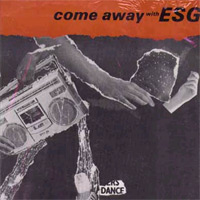
ESG
Come Away With... Reissue
(99/Soul Jazz; 1983/2006)
We here at CMG have only a limited amount of time and space every year in which to review albums. Many of us have jobs, academic responsibilities, significant others, or even some combination of the three. This precludes the reviewing of all the things we’d like to get around to. Still, not covering Soul Jazz’s release of ESG’s seminal Come Away with ESG is pretty inexcusable. Long out of print, never released on CD, and uncommon even by eBay standards, this is an album that has been begging for re-release. Come Away is a touch-stone for at least three genres, a legitimately Great Album and, even 23 years after its initial release, a completely fresh record. Sure, A South Bronx Story (2000) included most of the songs, but hearing them as they were supposed to sound-as 32 minutes of absolutely devastatingly funky drum fills, thick-as-sludge bass lines, and shouted choruses-makes it clear that the Scroggins sisters were so far ahead of the curve as to barely even be in competition. This record isn’t just impressive by the standards of its times; it’s slinkier, funkier, and more ass-shakingly fun than anything released in ’06 too.
Peter Hepburn
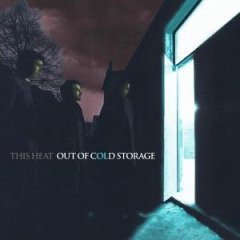
This Heat
Out of Cold Storage Box
(RnR)
Is it a huge surprise that I love This Heat? When Nool refers to me as “the eclectic one,” that’s actually short for “that dude over in the corner who isn’t Sean Ford who’s holding up a copy of Deceit and screaming.” This Heat, the eclectic post-punk band who isn’t the Pop Group, are basically the weirdest thing something we could probably still call “punk” has to offer, despite the fact that the members of This Heat pretty much hated the punk movement. Or hated punks who saw it as a “movement.” Were they better than that? Nobody records like This Heat did anymore. You might be able to create a facsimile if you nailed Herbert and Sunn o))) to Jim O’Rourke’s back, but why bother? Though Gareth Williams (the non-musician front man) tragically passed away in 2001, Charles Bullen and Charles Hayward are still around to discuss the hilariously elaborate lengths they went to in order to one-up one another, to record conceptually, and to politically motivate their listeners within the elaborate liners for this box. And what’s more refreshing than hearing two ex-band mates still fondly having the same argument over pronouns that they had 25 years ago: do we stand together with “we” or do we accuse “you”? It’s an incredibly complicated question, and both men’s casual, familiar, and constructive way of arguing against each other’s points suggests that a lot of this music came about the same way: by challenging one another. The music is simply a by-product, but it’s also our reward: This Heat and Deceit are two of the most odd and unremitting experimental pop albums ever; Health & Efficiency and Release are incredibly fun experiments, and Made Available and the live disc are nice companions. The remastering is excellent too, but the reason to own these albums is the fact that they exist at all, so who cares?
Mark Abraham

The Delgados
The Complete BBC Peel Sessions Comp
(Chemikal Underground)
Much like the band itself, The Complete BBC Peel Sessions initially seems fluffy and disposable. Once you start listening, though, and realize there is not a bum track over the course of this 29-song compilation, you begin to miss the Delagdos more than you ever thought you would. It’s not clear whether the band will ever release a best-of compilation, but if not, this collection does the job pretty well. Collecting sessions from 1995 to 2004, the two discs show the evolution of the band from a punkish indie band to a truly masterful pop-rock act. Moreover, it makes a pretty convincing case that the band was quite good throughout their entire career, as capable of effortless, indelible hooks in ’95 as they were nearly a decade later. “Under Canvas Under Wraps” and “4th Channel” still sound as energetic and fun as ever, while the lushly orchestrated “Pull the Wires From the Wall” and the flat-out gorgeous “Accused of Stealing” make you wonder why this band wasn’t bigger on this side of the Atlantic. Plus, we get Emma Pollack singing ELO’s “Mr. Blue Sky,” and if that doesn’t put a grin on your face then there’s probably no hope for you.
Peter Hepburn
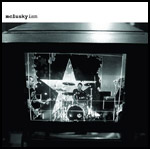
Mclusky
Mcluskyism Comp
(Too Pure)
I slept on Mclusky. I know; I suck. I knew who they were, and I could sing along with “Lightsaber Cocksucking Blues,” sure, but it was not until 2006 that I fully embraced the corpse of the finest, dumbest, loudest punk rock band of this pre-pubescent millennium. So everything I could tell you about Mclusky, or their fine retrospective Mcluskyism, is shit you already know. Like that this is the funniest goddamn band ever, and the humor doesn’t have punch lines that can grow old but comes from a genuine low-brow wit, one with a profane and hard-earned depth. Or that the “chorus” to “Alan is a Cowboy Killer” sounds like a plague of locusts looking to fuck, dissolving as quickly as they came back into the fuzzy thud of the verse. Or that “rope!” sounds like the Advantage playing the soundtrack to a malfunctioning Nintendo being eaten by Dead Rising. Or that “There Ain’t No Fool in Ferguson” is the lyrical equivalent to a Hieronymus Bosch painting. Or that Albini must’ve put a mic inside Stalin’s cage in Hell to get the frothing, carnal bass tone on “That Man Will Not Hang.” Or that “A-sides,” “B-sides” and “C-sides,” as the three discs of Mcluskyism are called, are irrelevant terms to a band that mixed like nitroglycerin, tequila and Truckzilla and were incapable of creating music that didn’t immediately set fire to its listener and devastate utterly the idea of ever forming a rock and roll band again. But you already know all this, right?
Clayton Purdom
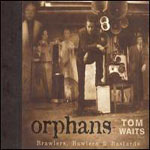
Tom Waits
Orphans: Brawlers, Bawlers & Bastards Comp
(Anti-)
Two days ago in North Carolina a woman, dissatisfied with a recent holiday purchase, and having had her request for a refund, exchange, or credit note refused by the retailer, turned to the police as a last resort to salvage her indulgence. Her complaint: “This crack is no good, my dealer ripped me off.”
When Tom Waits writes about this woman, the policeman will reply: “Well, ma’am, I’m sorry, but obviously the crack is good.”





